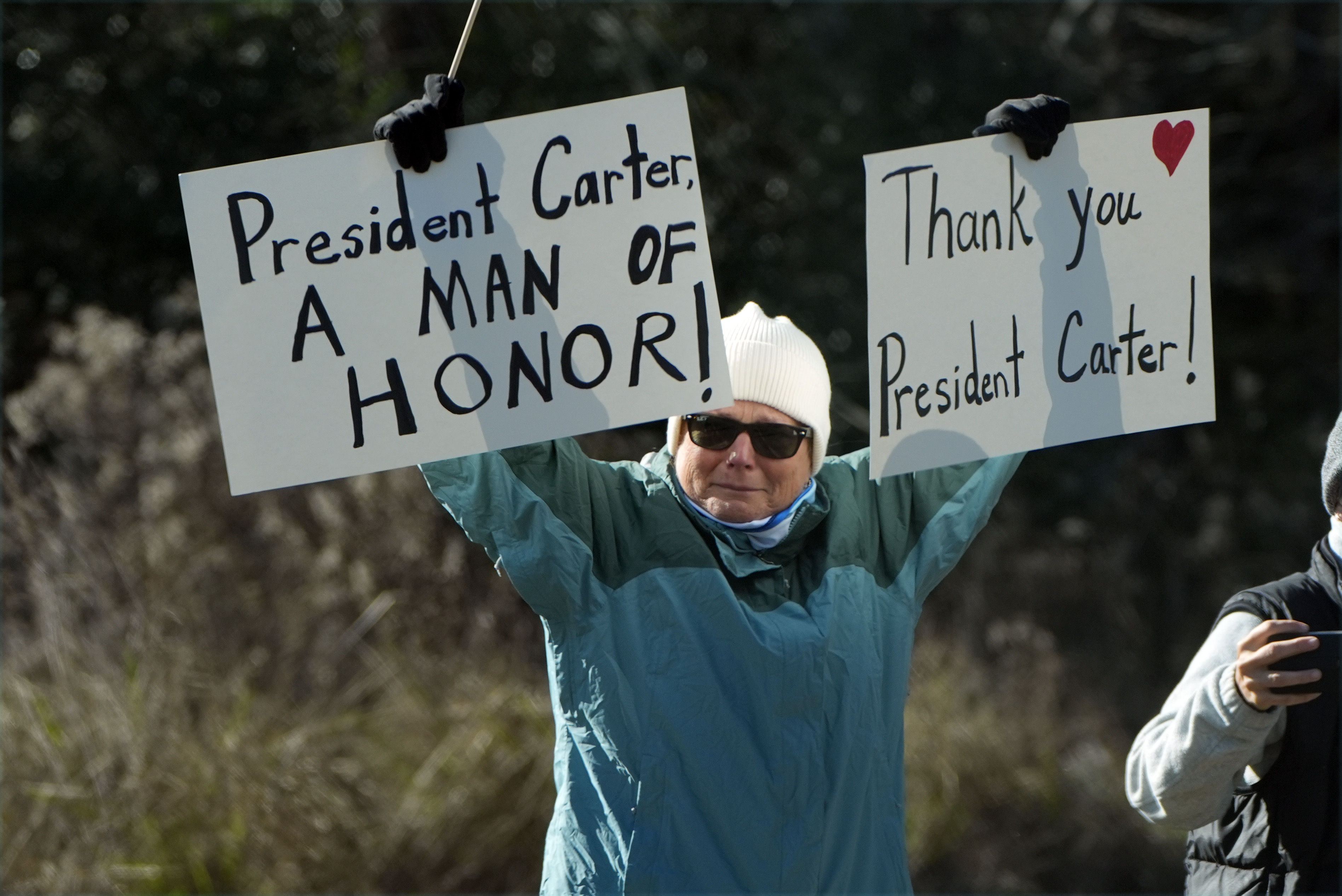Vice President Kamala Harris and the Democratic Party had sought to put abortion at the top of the election agenda, leaning into voter concerns about the path of reproductive health post-Roe and contrasting her stance against Donald Trump and the Republicans.
According to Pew, polling shows 63 percent of American adults believe abortion should be legal in all or most cases, versus 36 percent who think it should be illegal in all or most cases.
But her position on abortion wasn't enough to win Harris the White House, with other issues taking greater priority in the list of voter concerns overall.
Now, not only is the Supreme Court a majority conservative institution, but when Republican nominee Trump won the presidential election, he brought with him a GOP-majority House and Senate, creating a governing trifecta.
Many in the Republican Party long to see a federal ban of some kind on abortion, a practice they view as the unjustifiable ending of a human life. Trump, however, has said he is happy for abortion to remain with the states and does not want a federal ban.
Previously, a protected nationwide right to an abortion could be found in the Supreme Court's Roe v. Wade ruling from 1973. But the conservative-majority Supreme Court ruled in June 2022 to overturn Roe, putting the right to an abortion back in state hands.

"I'm not signing a ban, it's a lie," Trump said during the ABC News presidential debate in September when pressed on if he would sign such a law. "I'm not in favor of an abortion ban, but it doesn't matter because this issue has now been taken over by the states."
Ten states voted on enshrining abortion rights in 2024. Seven—among them Arizona, Colorado, Maryland, Missouri, Montana, Nevada, and New York—voted in favor of expanding or enshrining state abortion rights, including states that voted for Trump.
Three others—Florida, Nebraska, and South Dakota—rejected such proposals.
But, with Roe gone, Republicans in the Senate and House are still keen to introduce federal legislation that places a blanket national ban or tighter restrictions on abortion for the whole of the U.S.
Sen. Lindsey Graham (R-SC) introduced legislation for a federal abortion ban after 15 weeks of gestation back in 2022, and has said he disagrees that the issue should sit with the states.
He cited similar European standards on abortion limits and plans to reintroduce the legislation in the future.
If a Republican-backed bill ends up on Trump's desk, he may find its supporters in Congress trying to force his hand by using the progress of legislative initiatives he favors—or needs to deliver his platform—as leverage.
To advocates of abortion rights, it is a matter of bodily autonomy and a woman's right to choose if she proceeds with a pregnancy, and her wishes—often driven by health concerns, which can be life-or-death—should take priority over an unborn fetus.
With Republicans and conservatives in control of the White House, Congress, and the Supreme Court, Newsweek put a question to the country's top abortion rights activists: Will abortion rights survive Trump's Republican trifecta?
This is what they said.
Kimberly Inez McGuire, URGE
People will always have abortions—and help others to do so. While they may risk arrest or jail, people will keep self-managing their abortions whatever the politicians say, and others will help support this necessary care.
Even the anti-abortion politicians coming to Washington in January know how deeply unpopular abortion bans are. If they try to ban abortion nationwide, or further exacerbate the deadly crisis of abortion access currently unfolding, they risk alienating many of the people who voted for them.
Majorities of people in every state in this country want abortion to be legal and accessible—and those tempted to force their anti-abortion agenda on the American people will be met with righteous anger and a formidable resistance.
Lizz Winstead, Abortion Access Front
Abortion will survive because it always has. We have been fighting for access since long before Trump and it has become abundantly clear to activists and supporters of abortion rights that politicians will not save us so we must save ourselves and that is what we intend to do.
The game and the strategies may be different under this scenario but we are planning to work together, to get folks the reproductive care they need, whether it's abortion care, birth control or gender-affirming care, regardless of the obstacles they put in our way.
Christopher Wimbush, Interim President, Catholics for Choice
We know that President-elect Trump is responsible for appointing most of the justices that overturned Roe v. Wade.
Regardless of what he said during the campaign, we fully expect his allies to try to strip abortion rights away from the most vulnerable when they take office.
However, most voters support abortion access. Even in states that Trump and Republicans won handily, like Florida, Arizona, Missouri, Nevada, and Montana, abortion ballot measures received majority support.
So, if Republicans attempt to further restrict abortion access, they will have a voter problem. Catholics for Choice will be there every step of the way to fight back."
Rachel O'Leary Carmona, Executive Director, Women's March
It is gut-wrenching to think about what could happen to abortion access under a Trump administration, a Republican trifecta and a conservative Supreme Court.
From coming after birth control pills and contraception, to attacks on EMTALA, to women's rights at large, their plans to cut back reproductive freedoms are as extreme as it gets.
Abortion rights left to the states would be the best-case scenario. Instead of forging forward with progressive policies that would give women nationwide the right to make choices about their own bodies, and effectively their own lives, we must spend the next four years fighting for the bare minimum.
What we must do now is mobilize to protect one another in this upcoming period of politics.

Dr. Jamila Perritt, President & CEO, Physicians for Reproductive Health; Ob/Gyn in D.C.
While the United States election results are certainly disheartening and will result in anti-trans, anti-queer, and anti-abortion policy, I want to make it clear that even though abortion rights are always going to be under attack, abortion itself is never going anywhere.
Abortion care has been accessed for hundreds of years both inside of and outside of the formal health care setting. This care will not stop no matter the legal framework.
What will change with the law, however, is people's ability to get abortion care in the settings that are most supportive and accessible for them, depending on their unique goals, comfort, and needs.
When abortion laws change, abortion does not stop. Instead, it opens people who need and provide abortions up to unnecessary and dangerous surveillance and criminalization.
I am devastated that we have an incoming administration that has a proven past of not showing up for people who need and provide abortions. And I am committed to being in community with the advocates and organizers who have found a way in spite of ongoing attacks.
Destiny Lopez, Acting Co-CEO, Guttmacher Institute
Abortion access will survive, even while abortion rights are under attack.
We may not yet know what abortion rights will look like in two or four years, but if there is one thing we have learned over the last two years it's that people will continue to seek and find care, and that providers, abortion funds and other practical support organizations will find a way to help many people get the care they need.
The 2024 election showed that abortion remains a potent issue that is supported by clear majorities of voters even in red states like Florida and Montana. President-elect Trump explicitly ran on not restricting abortion at the federal level and instead leaving abortion to the states. The incoming administration and Congress would do well to remember that.
A Republican trifecta could potentially allow anti-abortion policymakers to unleash a range of policies that would be extremely harmful to abortion rights and access.
Congress could potentially pass a national ban or legislation that limits access to medication abortion. This would have national implications, including in states protective of abortion rights, and fly in the face of public opinion and voters that have protected the right in their state.
We'll be holding President-elect Trump to his word that he will not take this path, but we need to prepare for the worst. We are not giving up hope, and all is certainly not lost.
Lupe M. Rodríguez, Executive Director, National Latina Institute for Reproductive Justice
We are deeply alarmed about Trump's re-election and a Republican trifecta and what this will mean for access to all reproductive health care, including abortion care, particularly for im/migrants, Latinos/xs, and other communities of color.
We believe that abortion access will be further eroded under a Republican trifecta because many of those newly elected and re-elected into office support policies that would devastate our communities, including potentially a nationwide abortion ban.
Latinas/xs and im/migrants are the most affected by current abortion bans, and 27 states have banned or restricted abortion access as out-of-touch politicians across the country are rushing to ban abortion for even more people in this country.
This is not what we want. Despite a surge in misinformation about abortion this election cycle, it was still an important issue in races and ballot initiatives across the country, confirming what we've long known: Americans, including Latinos/xs, overwhelmingly support abortion access.
They do not want extreme politicians to ban abortion and interfere with their personal health care decisions.
The rights we have today were fought for over years, decades, and lifetimes. At the National Latina Institute for Reproductive Justice, we've been a part of this struggle for 30 years and we know that our work does not end on election day.



















:quality(85):upscale()/2024/04/24/878/n/3019466/36c5693c662965c5d1ce91.72473705_.jpg)
 English (US) ·
English (US) ·